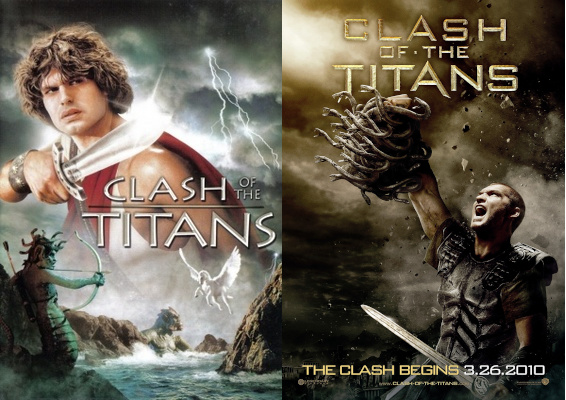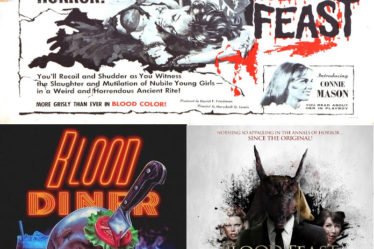
WARNING: This Review Contains Spoilers
I’m going to start off by saying that neither of these films got this part of Greek mythology quite right but there is such a thing as creative licence and truthfully, that isn’t what we’re here to talk about. In 1981, Harry Hamlin took on the role of the demi-god hero Perseus, son of Zeus, and his plight to save the city of Jappo and his love Andromeda. In 2010, Clash of the Titans was remade and Sam Worthington took up Hamlin’s mantel (try your best to excuse the strength of his accent).
Animation
Both of these films feature characters that border on being inhuman. It is clear, first of all, that technology has come a long way between 1981 and 2010. In the original film, Calibos, son of Thetis, Medusa, and Pegasus in flight are all created through stop-motion – Calibos actually being a mixture of the two. However, CGI had become a well-used technique in creating these kind of creatures by 2010 (take Beowulf for example and what was done with Angelina Jolie). I have to admit, looking back at the original film, it still does not look as bad as I am sure many of you would expect.
Speaking of Calibos, I feel like there’s something I need to bring to everyone’s attention. He is one of two characters whose history is changed between the two films (I’ll go on to explain the other) but for a fictional character specifically created for the films – I guess this shouldn’t be a surprise. In the original film, he is described as being the son of the goddess Thetis, and is cursed with a monstrous appearance by Zeus. However, in the remake – Calibos is actually Acrisius.
Story as a Whole
Like I have already said, neither of these films tell the original myth in its entirety but I guess it wouldn’t have made for an interesting story showing Perseus stumbling across Andromeda on his way home from a different quest. However, they do agree on some of the integral parts of the story – like the taking of Medusa’s head and using it to save Andromeda from the Kraken but how we get to this point and the tale along the way do vary somewhat.
Let’s start at the very beginning, with Perseus and his mother, Danaë. It is important to point out firstly, that character of Danaë is portrayed differently in each of the films. The original film matches the myth and tells that she is the daughter of Acrisius. Whereas, in the remake we are informed that she is his wife and is punished for the embarrassment her intimacies with Zeus have called him. In both versions of the film, they are thrown into the sea while inside a coffin but the outcome of his mother is different. In 1981, she survives this journey (as she does in the myth) and lives to raise her son. However, in the remake, when the coffin is found by a nearby fisherman – Danaë has died with a crying Perseus in her arms. He is then raised by the fisherman and his family, unknowing of who he really is.
Now to something that both films agree on, how he ends up in the court of Andromeda and her family, but not where that is. It is stated in the myth that Perseus was born in Argos, the coffin then carrying him to Seriphos and, as I already said above, he flies passed Aethiopia on his return home. Firstly, in neither film is Andromeda from Aethiopia. Instead, she is from either Jappo or, weirdly, Argos. Let’s start with the first film, Perseus ends up in Jappo by power of the goddess Thetis due to her anger at Zeus’ treatment of her own son Calibos. On the other hand, in the remake, Perseus is travelling passed Argos in his family’s fishing boat when they become collateral damage of an attack by Hades. As a result of this, the Argonauts bring him to shore and allow the king to decide his fate. As you can see, none of this is by his own hand.
Gifts from the Gods
I’m sorry to hark back to the original myth but it is the easiest way to compare the two films. So, to help Perseus defeat Medusa he is gifted with a helmet, winged sandals and a sickle. However, in the original film, instead of a sickle and sandals, he is given a shield and sword but in the remake, he is only given a sword.
Homage to the Original
In the original film, after the loss of his helmet, Perseus is gifted with a mechanical owl named Bubo. To me he’s the real hero of the original as it is Bubo who pulls Medusa’s head out of the sea after the Kraken has knocked Perseus off of Pegasus. However, Bubo only receives a cameo in the 2010 remake. When the soldiers are collecting their armour and readying to set off, Bubo is amongst the weapons but Draco tells them to leave him.
A Helping Hand
In both films, Perseus cannot face the trials alone and needs a little bit of help (not matter how grudgingly he behaves in the remake), but it is who helps him that changes. For anyone that has an interest in Greek mythology and films based around said subject, you’ll know how much of a meddling character Zeus can be. It is this characteristic of his that means Perseus receives the previously mentioned gifts and really that he survives the sea in the first place.
However, in the remake the meddling Zeus is replaced by the immortal character of Io (her immortality is also incorrect but I won’t bore you with this anymore). She has watched Perseus since he was born and was the one to save him, bringing him to his fisherman father. She also joins him on the journey to retrieve the head of Medusa – in my opinion becoming the new Bubo.
The Light Relief
I would say the remake tries to be a more action packed version of the story – which I believe is why they include a more obvious piece of light relief. For me, this would have been simply done by including Bubo as a character once again but I cannot complain about the addition of Kucuk and Ozal as they do bring something different to the film.
In Conclusion
Ignoring the mythological inaccuracies (too late!) but I do believe the original film is the better of the two. It feels like a more traditional version and does not try to be too over the top with the action.



[…] If you’ve read my article about Clash of the Titans, you’ve already heard me wax lyrical about the use of stop-motion animation. Well, I’m going to […]